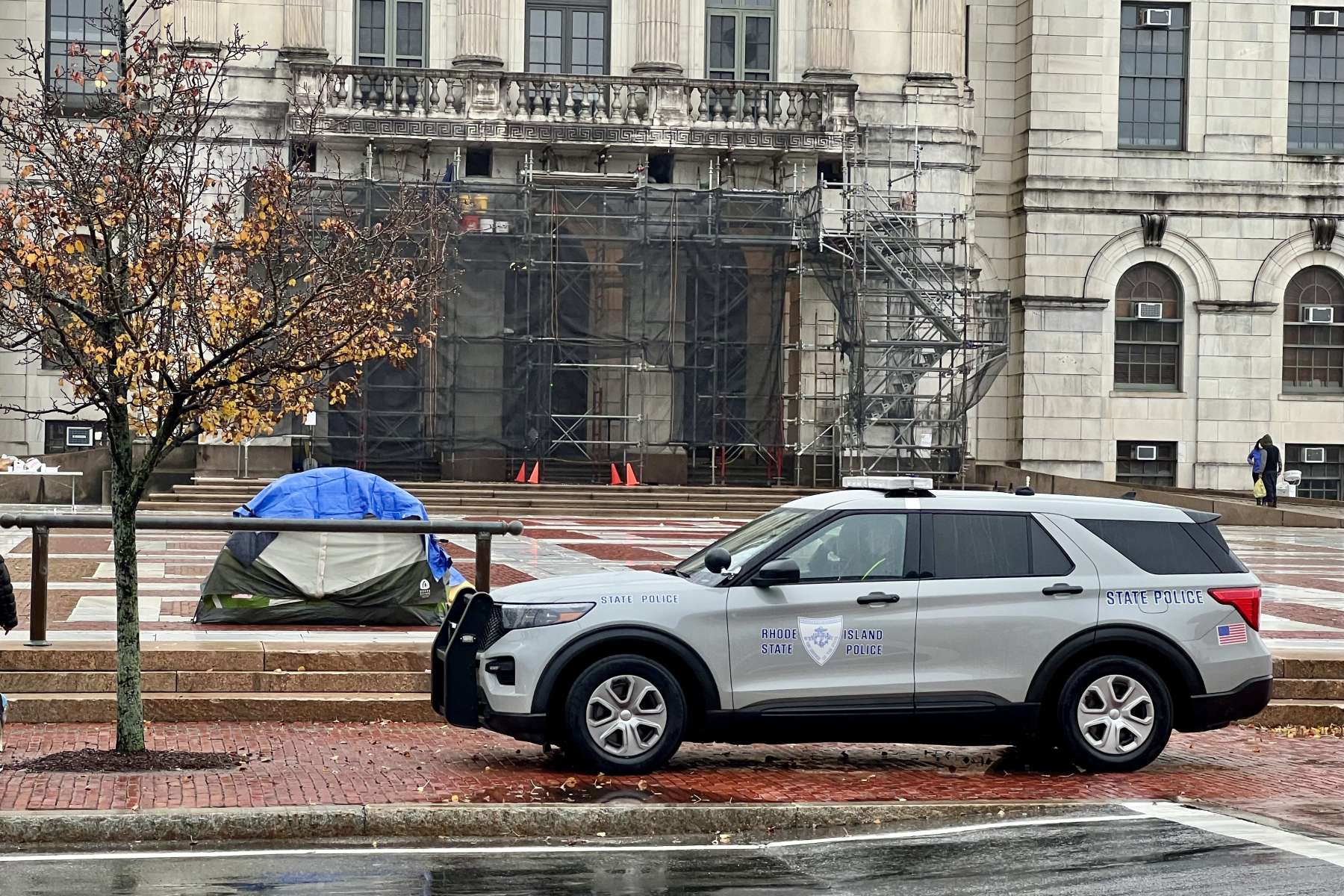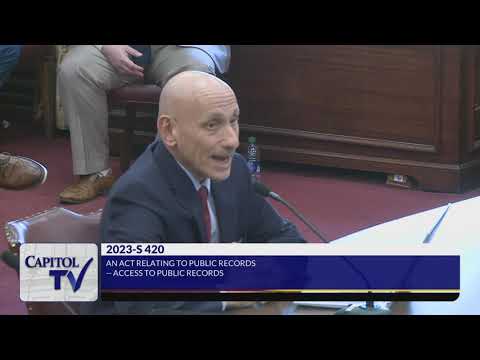A crucial turning point: state legislators consider overhauling police accountability
Rhode Island’s General Assembly is considering legislative changes focused on LEOBOR [de]certification, and APRA, potentially changing the state’s approach to police accountability. With an aim to bridge the gap between the police and the policed, will these changes lead to an improvement in public trust of law enforcement?
April 11, 2023, 9:34 am
By Steve Ahlquist
The House Judiciary Committee took up three different bills concerning the Law Enforcement Officer’s Bill of Rights (LEOBOR) last Tuesday, but LEOBOR reform or repeal is only a small part of reimagining public safety. LEOBOR, which providing special powers and protections exclusively for police officers, came about during a long, slow process beginning with the formation of police departments over a century and a half ago, through the civil rights battles and white flight from urban communities of the 1960s and 70s, up to today’s Black Lives Matter movement that is calling into question many of the decisions our society has made regarding what policing is and its limits.
Those thinking deeply about public safety are asking a simple question: Should communities shave a right to determine their own policing, and to what extent is it possible to hold police officers accountable, if at all?
HOW WE GOT HERE
In 1974 Florida and Maryland become the first states to codify a series of worker protections for police officers that we now called LEOBOR. Rhode Island became the third state to adopt LEOBOR in 1976. That law was revised in 1980 and had other minor adjustments made over the years, but the Rhode Island version remains the strongest version of LEOBOR in the country. Today there are 13 states with some form of LEOBOR. Maryland repealed their LEOBOR statute last year.
In its historical context, LEOBOR was passed in the aftermath of efforts by police officers to unionize. Public sector unions were a fairly new idea, and though police chiefs and many members of the public objected to police unions on the basis that they are a semi-militarized part of the government – and of course the United States military is not unionized, eventually a wave of unionization swept the country. This is why many police unions are known as “Fraternal Brotherhoods.” They started out as fraternities, that is, organizations, societies, clubs or fraternal orders associating together out of mutual interests. Fraternal Brotherhoods of Police began to lobby city and state legislatures, pushing for the right to unionize, and over the decades, and especially by the 1960s, were successful in these efforts. In Rhode Island, the state recognized the collective bargaining rights of police officers in 1963.
The adoption of LEOBOR statutes across the country can be seen as a reaction to the civil rights protests, some resulting in violence, happening throughout the late 1960s and early ’70s. As support for the police grew in white middle class America, police unions used their popularity to advocate for greater labor protections. As white people fled the inner cities over fear of integrated schools, police officers, not wanting to be left out, called for the repeal of residency laws that required them to live in the city where they worked. When Rhode Island did away with such residency laws in 1971, police officers could now live and pay taxes in rural and suburban communities, but police people and collect salaries in urban communities.
Over time, these changes in what police are, what police do, and where police live, separated police officers from the public they serve. Recognizing this expanding divide, police departments across the country adopted neighborhood policing initiatives as an attempt to bridge the gap between the police and the policed.
Tensions build when police officers operate in communities they are not a part of and only understand through the lens of law enforcement. Racial profiling and the criminalization of poverty and substance use too often replace nuanced understanding of racial inequity and poverty. In this context, police brutality and even extreme violence by police officers seemingly become inevitable, and law enforcement is seen as an occupying outside power, not community response to safety and order.
Which brings us to three areas of policing and public safety considered last week in the General Assembly: LEOBOR, [De]Certification, and APRA.
LEOBOR
House Bill 5888 from Representative (and Providence Police Officer) Raymond Hull (Democrat, District 6, Providence), makes minor tweaks to LEOBOR, mostly based on recommendations from a 2020 Senate Commission on LEOBOR chaired by former Senator Harold Metts. This bill, if passed without changes, would increase the number of people on a LEOBOR hearing committee from three to five. Currently LEOBOR hearing committees are made up of three current or former police officers. The two additional members under the Hull bill would be a retired judge and a member of Rhode Island’s Human Rights Commission. The bill would allow police chiefs to comment on the status of LEOBOR proceedings, something police chiefs can only do now after a LEOBOR committee has rendered a decision. Police Chiefs will be able to suspend officers for up to 14 days for violations, rather than the current number of days, which is two.
House Bill H6200 from Representative Jose Batista (Democrat, District 12, Providence) makes more substantive changes to LEOBOR. While this bill would also expand the hearing commission from three to five people and allow police chiefs to speak on the current status of LEOBOR proceedings, it would allow police chiefs to immediately discipline officers, rather than wait for a LEOBOR hearing to issue a verdict.
“My legislation would allow police chiefs to issue discipline to police officers rather immediately,” said Representative Batista. “It would not wait for a LEOBOR panel to finish before a chief can implement discipline, but it would honor and acknowledge the labor laws and actual due process that is required to give to police officers, namely being what we call in the legal profession a Loudermill Hearing.”
Loudermill hearings are part of the due process that all public sector employees enjoy. Subjecting police officers to the same level of due process as all other public sector employees does not constitute a violation of due process, maintained Representative Batista.
Batista further noted that “somewhere along the way” LEOBOR in Rhode Island has become the most favorable to police officers in the country. “In no other state can police officers have a [hearing] board made completely of police officers, select one of the police officers on that board, and have a voice as to who is the second person on that board.” Experts call LEOBOR in Rhode Island “super-sized due process,” said Representative Batista.
House Bill 5567 from Representative Jennifer Stewart (Democrat, District 59, Pawtucket) goes rejects reform and simply repeals LEOBOR in its entirety. Police Officers would be protected under the same labor laws that prevail for all public sector employees. 36 states in the country, and every New England state except for Rhode Island, currently operate under this framework.
Representative Stewart framed the repeal of LEOBOR as an appeal to democracy and its aspirational principles, which include the Rule of Law. “Where there is Rule of Law, nobody is above the law, all are subject equally to the law, and there is transparency,” said Representative Stewart. “An active Rule of Law helps to foster the public’s trust in institutions, especially those associated with government and the legal system.
“I’m afraid that since 1976, the existence of LEOBOR has undermined rule of law here in Rhode Island, and with it undermines trust in legislators like us, and in the police and the state’s judicial system,” said Representative Stewart.
Noting that only 13 states have some form of LEOBOR, Representative Stewart said, “Somehow, 36 other states have concluded [that] standard due process is sufficient,” adding that Rhode Island’s LEOBOR insulates police from due process more than most, both through the hearing board member selection process and the provision of full pay and benefits while the hearing process plays out.
Reforming LEOBOR does not solve the problem of LEOBOR, said Representative Stewart, “because it sets apart a group of people for special treatment, subject to special rules that are opaque to the public.”
Representative Stewart also addressed the argument that being a police officer is uniquely dangerous, and therefore deserving of the unique protections of a bill of rights. Firefighters, doctors, nurses, teachers and students all lack similar protections, she said. “As long as the State of Rhode Island continues to say that one group is entitled to a special set of rules, the state perpetuates inequality, abandons transparency, sidesteps simplicity and being clear, and promotes distrust.”
John Rossi, National Service Representative for the International Brotherhood of Police Officers testified against all three bills, but suggested that with changes, the Brotherhood might support the Representative Hull’s bill.
“LEOBOR is nothing more or less than due process that’s afforded to public employees,” said Rossi, ignoring the fact that it only applies to public employees that are members of law enforcement.
Michael Imondi, President of the Providence Fraternal Order of Police, agreed that some changes to LEOBOR are necessary, but argued that these changes should be slight.
“LEOBOR is not there to protect the officer that does something criminal. It’s not there to protect him from being disciplined. It’s just there to give him the fair process of an appeal should he or she feel that the discipline is not warranted for their actions. It gives the a platform to speak from in their defense,” said Imondi, later adding that “LEOBOR works. Currently as it is written, it works.”
[DE]CERTIFICATION
Related to LEOBOR is the issue of [de]certification. Rhode Island and Hawaii are the only two states in a country without a process whereby a police officer can be decertified, that is, prevented from pursuing a law enforcement career after being fired from a law enforcement agency.
Representative Batista’s bill, H6181, sounds very technical in nature, but is actually quite simple. The bill codifies the POST Board (Police Officers Standards and Training) which already exists in a semi-official capacity, according to the Rhode Island Police Chiefs Association. The purpose of the proposed 15 member board, made up of seven police officers, seven civilians and one member of the Rhode Island Attorney General‘s office is to “make sure there is consistency throughout the state for police officers as far as their training, screening [and] discipline,” said Representative Batista.
The reason this is important is that right now, there is no official system for tracking police officers who may have left a department due to infractions, only to find a job at another department elsewhere in the state.
Lobbyist and attorney Seema Sadanandan, on behalf of Arnold Ventures, spoke in favor of the legislation. You can read her written testimony here.
Batista’s bill, said Sadanandan, “would expand the authority of the POST, a state agency, so that it could both certify, and in instances of sustained serious misconduct by a law enforcement officer, decertify a law enforcement officer.”
Arnold Ventures supports the reform of LEOBOR, said Sadanandan. “We support removing any special protections that make it difficult, if not impossible, for chiefs to discipline officers in the case of serious misconduct.”
The POST Board, said Sadanandan, is separate from, but related to LEOBOR reform (or repeal). A decertified police officer would not be able to continue a law enforcement career in the state, preventing a “bad” police officer from switching departments and continuing their bad behaviors.
For example, a police officer in Woonsocket, who is about to go before a costly and possibly embarrassing LEOBOR hearing, might make a deal to leave the department, sealing their employment records in the process. While Woonsocket may be relieved to see a bad apple leave the force, that police officer is now able to seek employment in East Providence, where their bad behavior may continue.
Right now, said Sadanandan, Rhode Island Police Chiefs do share some information about officer misconduct, but Batista’s Bill would codify the process, making it “uniform and fair” and to “engender public trust.”
Sadanandan notes that nurses, teachers and lawyers such as herself are all subject to a statewide certification regime, and 48 states, excepting Rhode Island and Hawaii, have such a process in place for police officers.
It is important to note that Arnold Ventures is not necessarily being altruistic and public minded in their motivation. The group’s push for decertification can be seen as a small part of their general antipathy for public sector workers and unions.
Sadanandan described Arnold Ventures as a “philanthropic organization that advances data driven policy to make communities in America safer. We are among the largest criminal justice reform funders in the country.” That said, Arnold Ventures was originally known as the Laura and John Arnold Foundation, and worked tirelessly on so-called “pension reform” of the kind championed by Treasurer and then Governor Gina Raimondo. John Arnold, one of Raimondo’s biggest campaign donors, was described in Rolling Stone piece by Matt Taibi as “a dickishly ubiquitous young right-wing kingmaker with clear designs on becoming the next generation’s Koch brothers, and who for years had been funding a nationwide campaign to slash benefits for public workers.”
APRA
Both the Rhode Island Senate and House took up the issue of reforming the Access to Public Records Act (APRA) last week. APRA is the law that governs the release of public documents. Under the law, certain documents can be released to the general public if they are requested. APRA is an important tool for public oversight of government agencies and officials, and an important tool for journalists as well.
However, some government agencies, such as the Administration of Governor Daniel McKee, treat APRA requests with disdain, assessing outrageous fees for information in the public’s interest that they would rather not release.
The House and Senate bills to amend APRA would increase the number of documents that would be made accessible and to make the the release of public documents cheaper. Senator Louis DiPalma (Democrat, District 12, Little Compton, Middletown, Newport, Tiverton) introduced Senate Bill 0420 and Representative Joseph Solomon Jr. (Democrat, District 22, Warwick) introduced the identical bill H5454 in the House. Also considered in the House was Representative Edith Ajello‘s APRA bill H5442.
The DiPalma/Solomon bill makes the following changes to APRA:
- Open Meetings: Documents being discussed during open meetings will be made available to the public during the discussion so that the public will be able to follow along and understand the discussion by officials during the meeting. Documents must be posted along with the public announcement of the hearing.
- Subpoenas: Makes public any subpoenas issued by a governmental entity to a public body or official regarding official business.
- Cost: The bill would address costs by allowing the waiver of fees for requests that are in the public interest. It would also prevent a public entity from charging the requester for the time spent in redacting the files.
- Reduces the cost from 15 cents a page to five cents a page
- Under current law, the first hour of search for relevant records is free. This bill would double that to two free hours.
- Currently, one can ask a court to waive fees for documents in the public interest. This bill would allow public bodies and the Rhode Island Attorney General to waive such fees. The bill also increases penalties on entities that have been shown to be abusing the Act.
- 911: Would allow the public to 911 call information.
- Police Records: Would clarify and expand the kind of information the police must release under APRA.
- Clarifies the definition of what constitutes an initial arrest report. Some departments release a one paragraph summary of an arrest record, but this bill makes the entire police report narrative available.
- Makes final investigations of police misconduct are to be considered public records. A 2017 decision by the Attorney General differentiated between public generated and internal police investigations, allowing internal investigations to remain secret. This bill does away with that arbitrary distinction.
- Body-worn camera footage: Mandates the release of video documenting “use of force” within 30 days. Currently the Attorney General maintains this footage and releases it only when they feel it is appropriate.
- Increases penalties for government agencies that fail to comply in a timely manner to APRA requests.
- Government Official Correspondence: Makes such correspondence public to the extent that they are related to the officials formal duties.
The Ajello bill is more specifically focused on making police records more disclosable.
Chief Sidney Wordell, President of the Rhode Island Police Chiefs Association, opposed the legislation during the House Committee hearing, maintaining that there is a difference between internal investigations that are dealing with minor infractions such as “not wearing a hat” or “calling in sick” and more important allegations of serious misconduct. He would see the bill amended to keep internal investigations under wraps because such disclosures would make it more difficult to recruit officers into law enforcement.
Chief Wordell also spoke in favor of protecting the status quo regarding the release of body cam footage, maintaining that releasing the footage during an ongoing investigation makes it more difficult to fully investigate incidents of police or civilian misconduct during use of force investigations.
The Chief also opposed the release of all subpoenas because such a policy would threaten law enforcement’s ability to properly pursue investigations.
The most startling admission from Chief Wordell was that it takes around 90 minutes to review and redact one hour of body-worn camera footage. Police worn body cameras were ostensibly introduced to increase transparency and to hold police officers more accountable.
Lowering the public cost of accessing body-worn camera footage is, “going to bury law enforcement,” said Chief Wordell. “Other than maybe the Governor’s office we probably receive, collectively across the state, the most requests for those public records and it’s just not something that can be done. And the ability to keep that in check, unfortunately, is to be able to charge them for it.”
If the public has limited, or very expensive, access to police worn body camera footage, then the only time body camera footage may be released is when police departments believe that the footage validates the actions of police. If such footage cannot be made available to the public, police worn body cameras should be discontinued, because the public will not be benefiting from their adoption.









